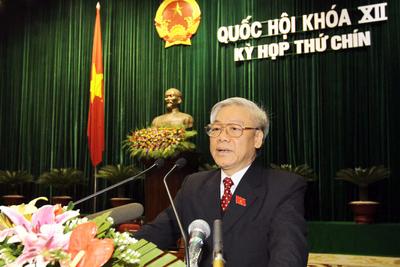Executive reshuffle: Vietnam’s troika leadership seeks balance eastasiaforum

This May, Vietnam’s National Assembly will confirm the selection of a new executive ‘troika’ to guide the country’s development for the next five years.
Current chairman of the National Assembly Nguyen Phu Trong will take the top spot as General Secretary of the Communist Party; Truong Tan Sang, a prominent Politburo member, will assume the role of State President; and Prime Minister Nguyen Tan Dung, re-elected, will keep his post as head of government.
A product of political compromise, the troika helps to sustain the balance of power between government and party institutions, and mitigates intra and extra party conflicts. In notable contrast to China, where the top executive roles in each institution are vested in one individual, since the constitutional reforms of 1992, each member of Vietnam’s troika has managed to preserve the authority that comes with his position.
Though more democratic distribution of leadership roles distinguishes Vietnam’s political structure from China’s, Vietnam — like China — is not immune to intra-party struggle, conflicting institutional priorities, and geographic rivalries.
Though the leadership transition during Vietnam’s 11th Party Congress was smoothly handled, even these planned leadership transitions cannot anticipate personality clashes sure to manifest themselves later. Navigating the current economic turbulence will require cooperative leadership; Vietnam cannot afford a divided troika that harks back to the days of Rome’s bloody triumvirates. To operate together, the three executives must possess a clear strategic vision for sustainable long-term growth, flexible interpretations of the party line, and openness to public and private sector reform.
What follows is a brief look at the two new faces on the troika scene, with some observations on how they will help construct — or obstruct — the vision for the next five years.
Nguyen Phu Trong (General Secretary) – The general secretary is generally considered the top post in the party and Vietnam, but there are those who would claim the position is toothless. After all, though Nguyen Phu Trong’s predecessor Nong Duc Manh was regarded as a moderniser who pushed anti-corruption and growth policies, he was still widely viewed as having taken the ‘back seat’ in party and state politics and was eventually sidelined by Truong Tan Sang (see below). Similar assessments have already been made of Trong, who holds the number one position in the Politburo Secretariat, an administrative arm that handles day to day management, but is ranked number seven or eight in the more important full Politburo. His doubters fear his ranking and age will incapacitate him.
But Trong’s grandfatherly appearance belies his adept political skills, and it would be foolhardy to dismiss this force in the troika. As former Chairman of National Assembly, he grew the body into more than just a rubber stamp parliament; the normally compliant Assembly criticised Prime Minister Dung for his handling of the Vinashin crisis and his approval of the controversial bauxite mining program with China. Moreover, Trong is widely regarded as ideologically conservative, having served previously as Vietnam’s chief political theorist in his position as Chairman of Vietnam’s Central Theoretical Council. His ideological orientation and northern conservatism may put him at odds with the prime minister and president, both southerners more open to market reform.
Truong Tan Sang (State President) – Though Truong Tan Sang has taken over the largely ceremonial role of President, he maintains a high profile as the highest-ranking officer in the Politburo. (He defers to General Secretary Trong only in the Central Committee Secretariat). Sang is seen as a longtime rival of Prime Minister Nguyen Tan Dung, a fellow Southerner, having overtaken the Prime Minister in 2009 to secure the number two spot in the Politburo at the time. Following this maneuver, and in the run-up to the 2011 Party Congress, Sang was also seen as having aggressively ‘eclipsed’ his superior, General Secretary Nong Duc Manh, who eventually relinquished most of his official duties to Sang.
It remains to be seen how Sang will reconcile his own ambitions with the need for cooperation within the troika to move forward on important policies requiring the three leaders’ consent. In contrast to the Prime Minister and Trong, who both prefer close relations with China, Sang is seen as more interested in strengthening relations with Japan, an area that will inevitably become a point of contention for the troika leadership.
As Vietnam charts its course for the next year, its leaders are cognisant that the country can only prosper under forward-looking and cooperative leadership. Before the financial crisis, the troika’s synergy helped steer the country towards a remarkable average 8per cent GDP growth per year. But Vietnam now faces severe economic troubles, plagued by double digit inflation and stagnating export markets. The ideal of cooperative leadership may be harder to realise in practice. Intra-party factional disputes may be subtle to the casual observer, but they are fierce. In the interim period before the National Assembly confirms the election results, we should hope the newly elected leaders of the troika will not only map out short and long-term growth strategies—as focused on economic recovery as they are—but also consider how they might reconcile their personalities, preferences, and policies such that Vietnam prospers under the rule of three.
Derek Pham is an Intern Scholar with the CSIS Southeast Asia Program.
This piece originally appeared here, on Cogitasia. (không vào được ???)